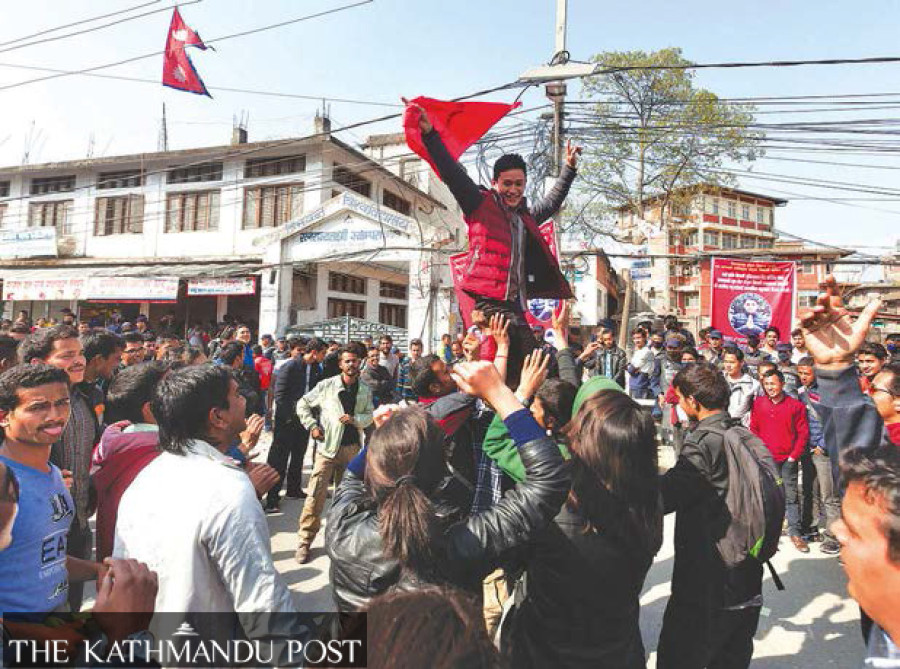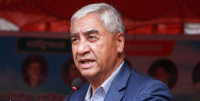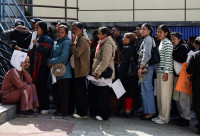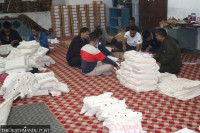National
As college polls inch closer, student unions plan alliances
Change in national politics likely to reflect in campuses with students supporting ruling parties coming together. This pits eight unions against the UML wing.
Post Report
The process for the long-pending Free Student Union elections commenced on Friday with the registration of student organisations willing to contest the poll scheduled for March 19.
The Tribhuvan University had called the student unions willing to contest the elections to get registered at the respective colleges. Only the registered unions can participate in the polls. A committee led by the campus chief has been formed in each college to organise the elections.
“The registration of student unions is over at least in the constituent colleges. In case the registration process didn’t complete in any college on Friday, it will continue on Sunday,” Pashupati Adhikari, chief at the Directorate of Student Welfare and Sports at the university, told the Post.
In addition to 61 constituent colleges, the university administration wants to conduct the elections in its 1,040 affiliated colleges—both community and private. However, it is not mandatory for the private affiliated colleges to hold the free student union elections.
The university directed all its constituent and affiliated colleges to prepare for the March 19 polls. “However, we cannot force the private colleges to conduct the election,” said Adhikari. After the registration of the unions, the nomination of candidates for both the first-past-the-post and proportional representation categories would be done on March 11. The president, secretary, treasurer
and 50 percent members are elected directly, while the vice-president, joint secretary and the other 50 percent members are elected through proportional representation. In 2017, the university started allowing only those students who are below 28 to contest the elections and vote.
The colleges under the university will elect student representatives for two years during which the council can raise students’ concerns with the administration and organise other welfare programmes.
As per the university regulation, the strength of the elected representatives in each college depends on student enrolment. An 11-member committee including the president, vice-president, secretary, joint secretary, treasurer and six members are elected in the colleges with up to 200 students. A 15-member panel is elected when the number of enrolled students is between 201 and 1,000. The committee has 19 members in colleges having 1,000 to 3,000 students. Likewise, the FSU executive committee has 21 members, if the student enrolment exceeds 3,000.
The student unions affiliated to the eight ruling parties are preparing to form an alliance to challenge the opposition. “There has been a broader agreement among student wings of the ruling parties to contest the poll jointly,” Sudesh Parajuli, chairperson of the All Nepal National Free Student Union affiliated to the Madhav Kumar Nepal-led CPN (Unified Socialist), told the Post. “The sharing of the portfolios will depend on the strength of each union in the respective colleges.”
Nepali Congress, CPN (Maoist Centre), Janata Samajbadi Party, CPN (Unified Socialist), Janamat Party, Loktantrik Samajbadi Party, Nagarik Unmukti Party and Rastriya Janamorcha are constituents of the eight-party alliance.
The fight of the eight unions will be against the All Nepal National Free Student Union, affiliated to the CPN-UML. Samik Badal, chairperson of the UML’s student body, said his union is against the formation of alliances in all colleges. “There can be partnerships with some unions in some colleges. Largely, we will contest the polls alone,” he told the Post. “We are ready to fight the alliance of the eight student wings.”
The biennial elections held periodically until 2009 have been irregular of late. The last time the polls took place was in 2017. The polls, however, could be held in just 35 constituent campuses and some 100 community colleges following differences among student unions and incidents of violence. Student leaders say they expect the elections to take place in 510 colleges this time.
The March 19 elections will be the 27th iteration of the student polls that was first held in 1962. Until 1974, the elections were held annually.




 22.17°C Kathmandu
22.17°C Kathmandu













